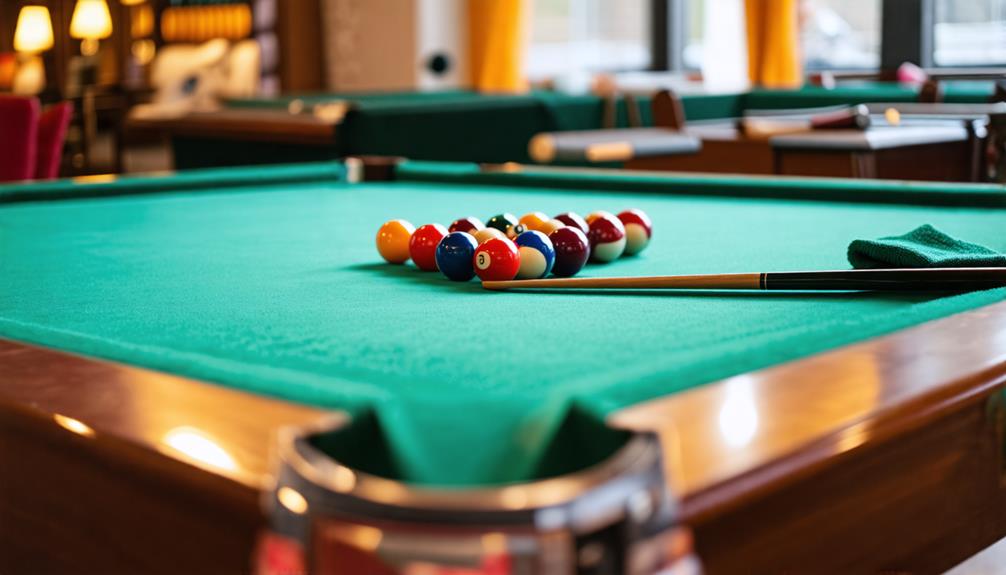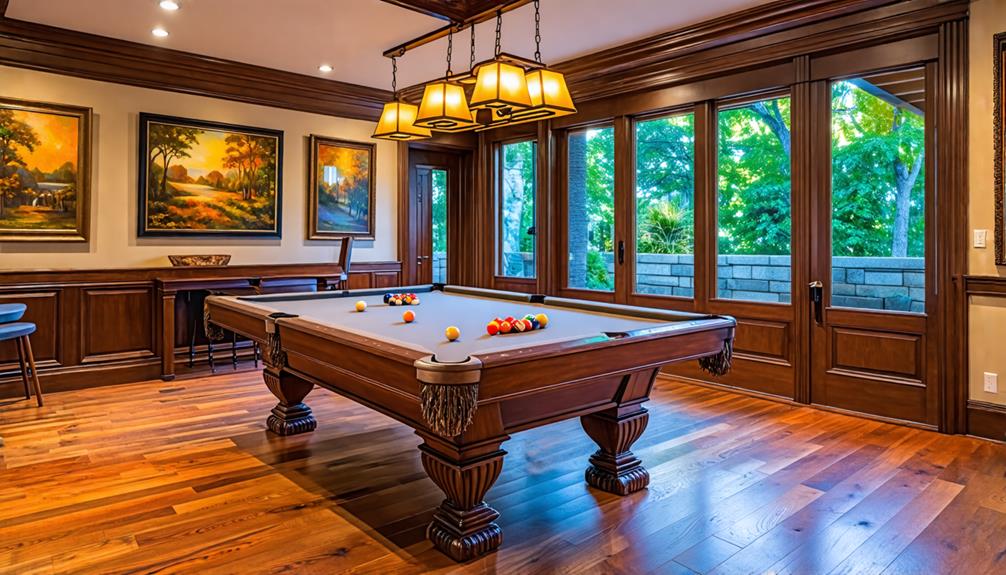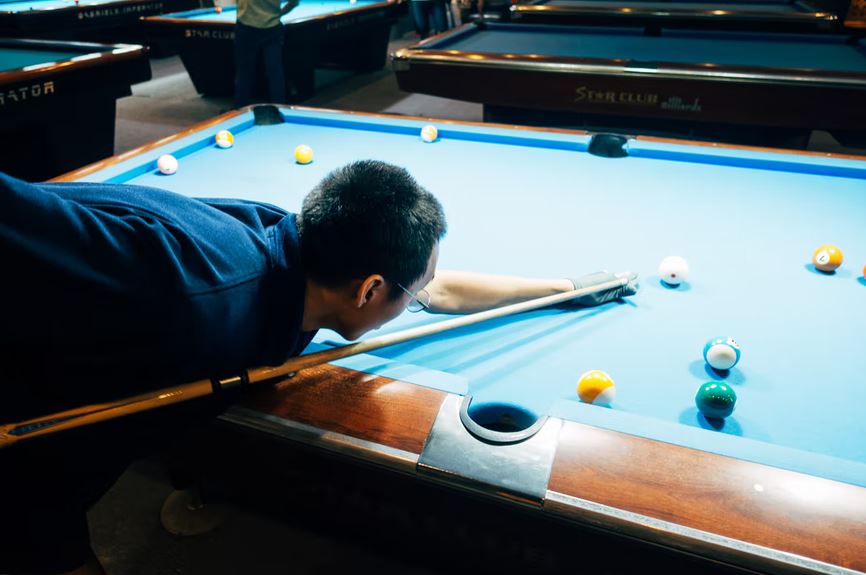What Are the Best Types of Flooring Options for a Home Game Room With a Pool Table
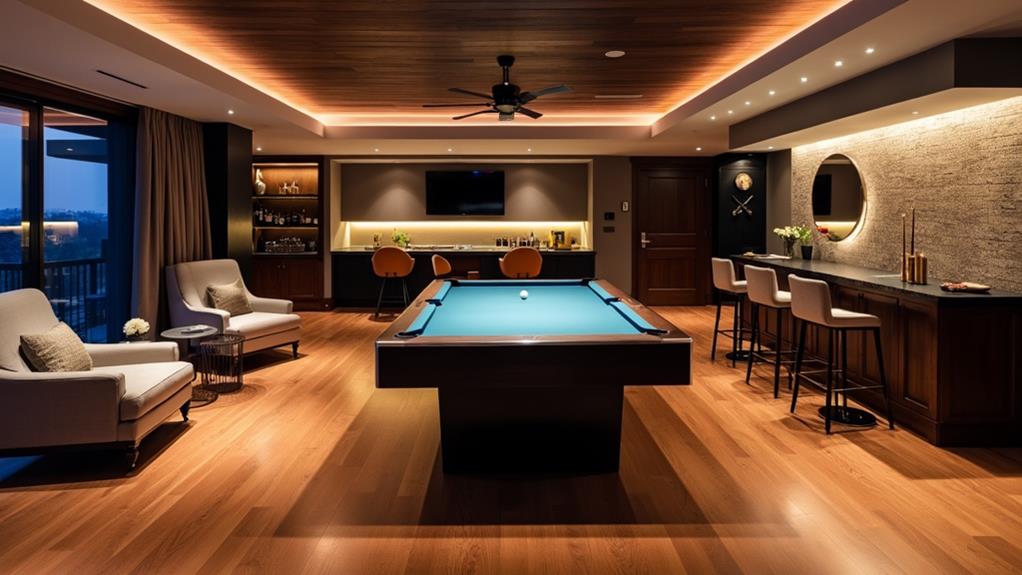
For your home game room with a pool table, opt for flooring that provides stability and moisture resistance. Hardwood and laminate floors are sturdy, while luxury vinyl and tile handle humidity well. Carpet can create a cozy atmosphere but requires more upkeep. Use rubber mats under the table legs to prevent indentations. Consider budget-friendly options like vinyl, which offers durability and easy maintenance. Engineered hardwood is another great choice for handling moisture fluctuations. Investigate different materials to find the perfect blend of style, function, and cost-efficiency for your game room. You'll uncover more significant details as you delve further.
Stability and Support
When setting up a home game room, guaranteeing stability and support for your flooring is crucial, especially if you plan to include heavy equipment like a pool table. With pool tables weighing between 400 to 1,000 pounds, you need flooring that can handle substantial weight without warping or sinking over time. Consulting an engineer or flooring specialist is a smart move to assess the load-bearing capabilities of your underlying support structure. This step guarantees your chosen flooring types can offer the necessary stability and support.
Opt for materials like tile, hardwood, or laminate, known for their strength and durability. These flooring types provide a stable base and minimize the risk of damage from heavy equipment. Regular leveling of the flooring is also important. Uneven floors can affect the pool table's stability, throwing off gameplay accuracy.
To further protect your floor, consider incorporating rubber mats or protective pads under the pool table legs. These enhancements help distribute the weight evenly and prevent indentations, particularly in softer flooring materials. By focusing on stability and support, you'll create a game room that's both functional and durable.
Moisture Resistance
In a home game room, moisture resistance is vital, especially if your game room is in a basement where humidity levels can soar. High humidity can lead to water damage, making it imperative to select flooring that can handle moisture effectively.
Vinyl flooring stands out for its exceptional moisture resistance. It can withstand spills and high humidity without warping or degrading, making it a top choice for game rooms. Likewise, tile flooring, especially ceramic or porcelain, offers robust moisture resistance and is easy to clean. Any accidental spills or dropped beverages won't stand a chance against tile, which remains unaffected by water exposure.
Engineered hardwood provides a stylish alternative with better moisture resistance compared to traditional hardwood. Its layered construction helps prevent warping, even in environments where moisture levels fluctuate. While it offers the aesthetic appeal of real wood, it's more equipped to handle the challenges of a humid game room.
Ultimately, choosing moisture-resistant flooring like vinyl, tile, or engineered hardwood guarantees that your game room remains in top condition, regardless of humidity levels. Prioritizing moisture resistance protects your investment and keeps your game room looking great for years to come.
Budget and Maintenance
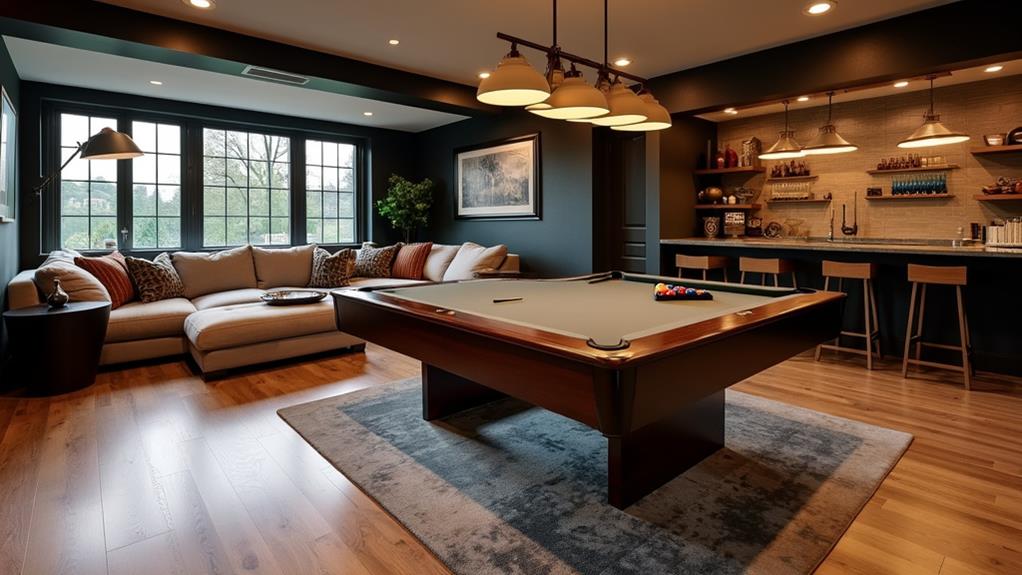
Balancing cost and upkeep is vital when selecting the right flooring for your home game room. Your budget will greatly influence the types of flooring you consider. Luxury vinyl is a budget-friendly option, offering durability and ease of maintenance. In contrast, hardwood flooring may require a larger investment due to higher material costs and potential maintenance such as periodic refinishing.
Maintenance is a key factor to weigh. Tile and vinyl flooring are easy to clean, requiring minimal effort to keep them looking pristine. On the other hand, carpet demands more frequent vacuuming and occasional stain treatments, which can add to your ongoing maintenance tasks. If you're looking to balance budget and upkeep, laminate flooring is a solid choice. It mimics the look of hardwood while being more affordable and simpler to maintain, though it might not withstand heavy weight as effectively.
Don't overlook long-term durability. While the initial cost of more resilient materials like tile or engineered hardwood might be higher, their longevity can offset the expense by reducing the frequency of floor replacements or repairs. Factoring in potential maintenance costs, such as sealing for tile, helps you make a well-rounded decision for your game room flooring.
Carpet Flooring
Once you've considered both budget and maintenance, it's time to investigate the cozy appeal of carpet flooring for your home game room. Carpet flooring creates a comfortable and inviting atmosphere, perfect for social gaming environments. With its soft texture, it provides a cushioned surface, making it ideal for long hours of gameplay and reducing fatigue.
Opt for shorter fiber carpets in your game room to minimize the risk of snagging and to make it easier to clean and maintain. Shorter fibers also help manage chalk dust and spills that are common in a game room with a pool table. Carpet's ability to absorb sound is another significant advantage, reducing noise levels and creating a more pleasant environment for both players and spectators.
Consider choosing a stain-resistant carpet to improve durability and simplify maintenance. This type of carpet is designed to withstand high traffic and resist spills, making it a practical choice for an active game room. However, keep in mind that carpet may require regular leveling to guarantee a consistent playing surface, especially under the weight of a heavy pool table. With the right selection, carpet flooring can be both a cozy and functional option for your game room.
Rugs and Mats
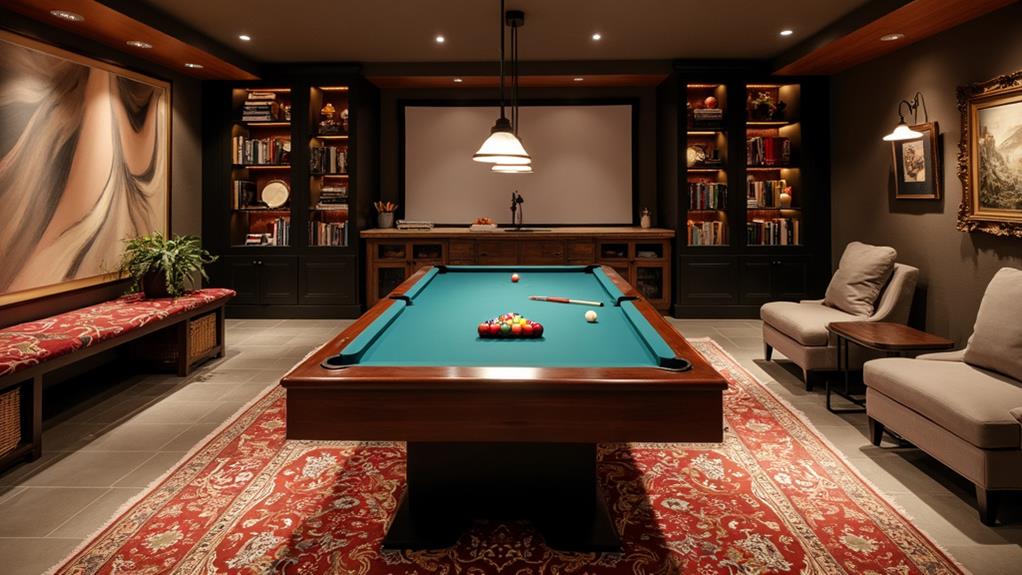
Adding rugs and mats to your home game room can greatly improve the comfort and functionality of the space. They provide a cushioned surface underfoot, making long gaming sessions more enjoyable. When you have a pool table, rugs and mats are necessary for protecting your hardwood floors from scratches or damage caused by dropped billiard balls or the table's legs.
Choosing the right type of rug is significant. Opt for rugs with low pile heights to guarantee they don't interfere with the gameplay. Low-pile rugs are also easier to clean, a considerable benefit considering the chalk dust and potential spills that can occur in a game room.
Another key feature to look for is non-slip backing. This prevents the rugs and mats from shifting during play, which is critical for maintaining the pool table's stability and your gameplay's accuracy. A rug that moves can disrupt your shots and even pose a tripping hazard.
Regular cleaning and maintenance of your rugs and mats will keep them looking new and extend their lifespan, especially in high-traffic areas. Make certain to vacuum frequently and address any spills or stains promptly to maintain a clean and inviting game room environment.
Hardwood Floors
Hardwood floors offer a timeless elegance that can improve the atmosphere of any home game room. They provide a classic aesthetic that perfectly complements the ambiance, making your space look sophisticated and inviting. Plus, their durability is a significant advantage. Hardwood floors are strong enough to support the heavy weight of a pool table, reducing the risk of damage to both the flooring and the table itself.
In addition to their strength, hardwood floors are practical for a game room setting because they minimize the risk of chipping or denting from dropped billiard balls. This feature guarantees that your flooring stays in prime condition, even with frequent use. Although hardwood is susceptible to moisture damage, you can apply protective finishes to boost its water resistance and longevity, making it more suitable for a game room environment.
To keep your hardwood floors looking their best, regular maintenance is vital. Cleaning and refinishing not only extend the life of the floors but also guarantee a smooth and even playing surface. This attention to detail will provide superior gameplay, making your game room a favorite spot for friends and family.
Laminate Options
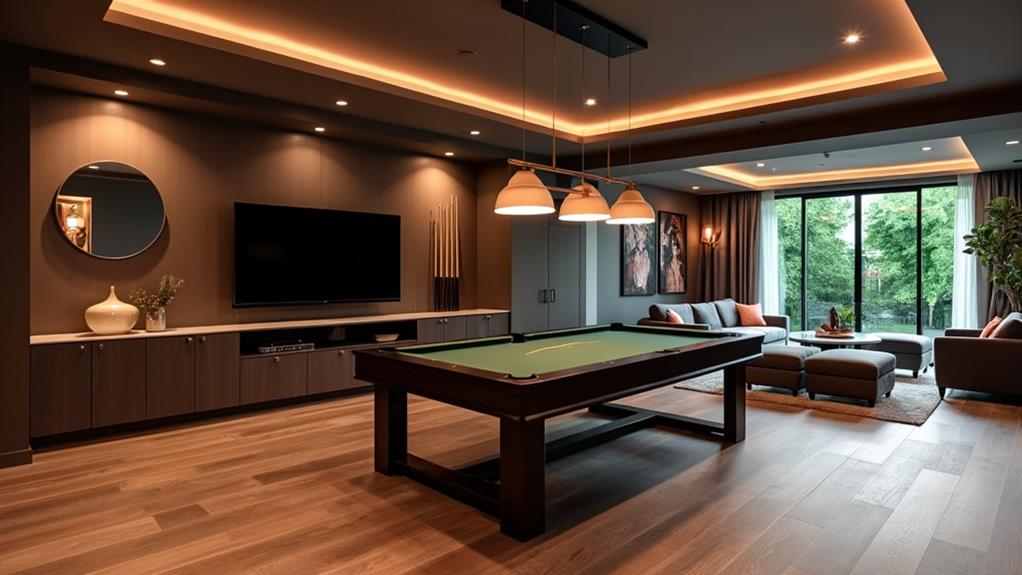
Laminate flooring's versatility makes it a top choice for home game rooms. It's a cost-effective option that mimics the look of hardwood or stone, providing a touch of elegance without breaking the bank. The multi-layered design of laminate flooring is particularly beneficial for game rooms, as it's moisture-resistant and can handle the occasional spill during intense gameplay. Plus, maintaining it is a breeze—just regular sweeping and an occasional damp mop are all you need to keep it clean and free from chalk dust.
One of the standout pros of laminate flooring is its impact absorption. This feature reduces noise and minimizes damage from dropped pool balls, creating a quieter, more enjoyable environment for your game nights. Installation is straightforward, making it a popular pick for DIY enthusiasts who want to improve their game room without incurring high labor costs.
However, like any flooring option, laminate has its cons. While it's durable, it's not as long-lasting as real hardwood. Furthermore, it can't be refinished like wood, so once it's worn, it needs replacing. In summary, laminate flooring offers a great balance of affordability, style, and practicality for game rooms.
Vinyl and Linoleum
In relation to game room flooring, vinyl and linoleum stand out as top contenders because of their durability and moisture resistance. If your game room is in a basement or an area prone to spills, these materials are perfect. Vinyl flooring, especially luxury vinyl planks (LVP), offers a variety of styles that can mimic natural materials, giving your game room an elegant look while providing a softer underfoot feel compared to traditional tile or hardwood.
Linoleum, on the other hand, is made from natural materials like linseed oil, making it an eco-friendly choice. It's easy to clean and maintain, which is vital for high-traffic game rooms. Both vinyl and linoleum can handle the weight of pool tables, but it's important to guarantee proper subfloor preparation to prevent indentations over time.
One of the best parts about choosing vinyl flooring or linoleum is that installation can often be a DIY project. These materials typically come in interlocking planks or sheets that you can easily cut to fit your space. This makes updating your game room not only practical but also cost-effective.
Tile Choices
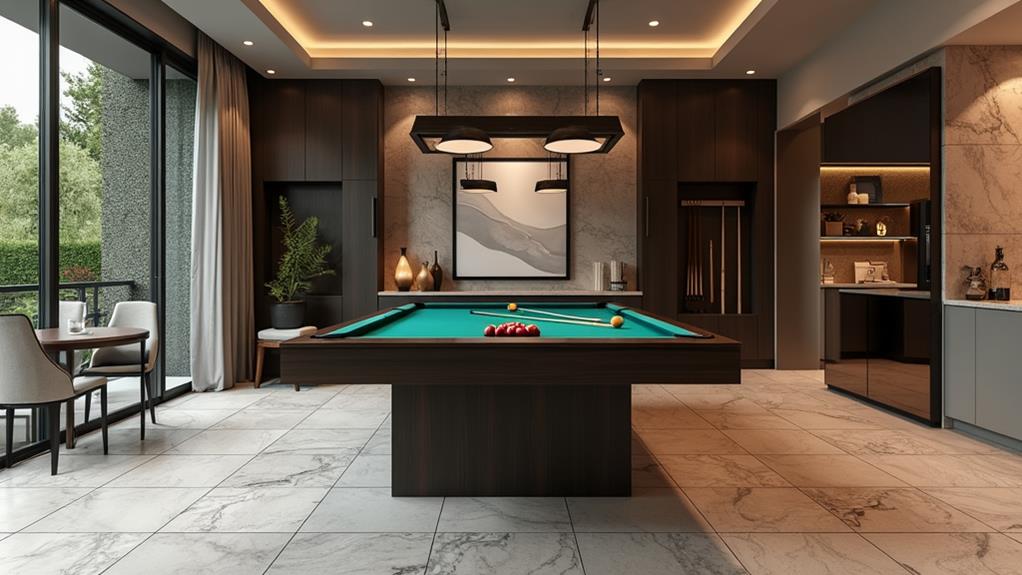
When considering robust and stylish flooring options, tile flooring emerges as a stellar choice for your game room. Tile floors are highly durable and water-resistant, making them perfect for areas where spills and moisture are common. This assures that your game room remains pristine and functional over time, no matter the level of activity.
Tile floors come in a range of designs and textures, allowing you to match them with your game room's decor seamlessly. Regardless of whether you prefer a sleek, modern look or a more traditional aesthetic, there's a tile option to fit your vision. One major advantage of tile flooring is its precise leveling, which is vital for the stability and performance of your pool table. An uneven surface can negatively impact your game, but properly installed tile guarantees a flat and reliable playing area.
While traditional ceramic tiles can crack under heavy weight if not properly supported, luxury vinyl tile (LVT) offers a fantastic alternative. LVT mimics the appearance of traditional tiles without the risk of cracking, providing a softer yet similarly stylish option. Maintenance is also straightforward, as tile flooring is easy to clean and resistant to stains, assuring your game room looks polished and inviting for years to come.
